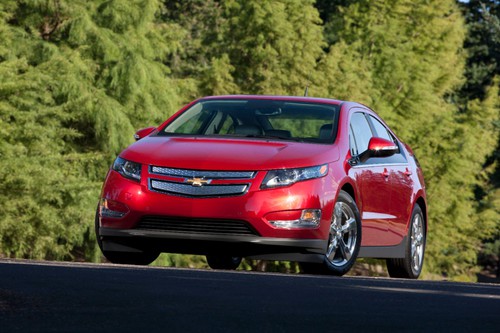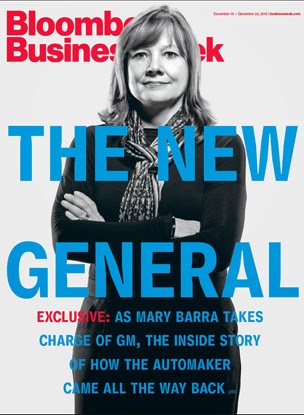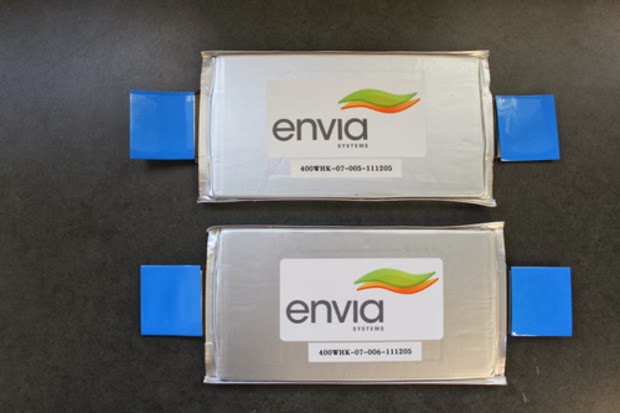According to a Bloomberg News piece diving deep into how Mary Barra came to replace Dan Akerson as CEO of General Motors, we learn that GM is planning to introduce a 200+ mile range plug-in hybrid electric car (electric car with range extender) by 2016, that will cost about $30,000. Those specs are meant to compete with Tesla Motors, whose “affordable mass market electric car” is slated to go on sale in 2017, offer a 200+ mile electric range, for an MSRP of $35,000.
We’ve long known that GM is planning such a vehicle, over the last couple years GM’s CEO Dan Akerson has repeatedly said so. It’s not just GM, but of course Tesla Motors is projecting a similar range/price combination, and recently Renault made a similar prediction![]() . Reading between the lines one expects that one or more of the battery technology breakthrough’s we’ve been waiting for is looming close on the horizon.
. Reading between the lines one expects that one or more of the battery technology breakthrough’s we’ve been waiting for is looming close on the horizon.
In the case of General Motors, we’ve long thought the battery breakthrough was going to come from Envia Systems. In early 2012 they’d promised to slash the price of battery packs while radically increasing the energy storage capacity. Lower price per kilowatt-hour while storing more kilowatt-hours in the same volume/weight would mean a radically different sort of electric car. One that’s not only more affordable but offers a longer range.
But some recent news about Envia Systems throws doubt on whether GM will be able to pull it off. GM had invested in Envia Systems, and the claims by both GM and Envia matched up, making Envia the likely supplier for the battery breakthrough GM would require. But, over on GigaOM![]() they have turned up documents filed in two lawsuits against Envia which say Envia’s claims were bogus, a hoax. Further, GigaOM claims that GM has canceled their deal with Envia.
they have turned up documents filed in two lawsuits against Envia which say Envia’s claims were bogus, a hoax. Further, GigaOM claims that GM has canceled their deal with Envia.
Which leaves us puzzling over just how GM could still be claiming to be planning a 200+ mile range electric car, at the $30k price range, by 2016.
Tesla Motors proves to us that there’s no rocket science behind a 200+ mile range. Just put a big-enough battery pack, 60 kilowatt-hours is enough, in the car. The problem is to do so while making an affordable car. That’s what will determine whether electric cars get to the tipping point any time soon.
Another puzzler is why GM is insisting on putting a range extender on a 200+ mile range car. We understand that for a 40ish mile range electric car, or even 80ish mile range, it’s nice to have a “range extender” as a way to mollify range anxiety. But with a 200 mile range it’s not necessary to have the extra complexity of adding a range extender. That’s because 200 miles of range is far more than enough to handle even extensive daily driving around a city, leaving the typical need for more range to the Road Trips. Relying on fast charging for Road Trips, just like Tesla and Nissan is doing, would make the car simpler and give some more on-board space for more cargo area or more battery capacity or a lower MSRP.
- Highway design could decrease death and injury risk, if “we” chose smarter designs - March 28, 2015
- GM really did trademark “range anxiety”, only later to abandon that mark - March 25, 2015
- US Government releases new regulations on hydraulic fracturing, that some call “toothless” - March 20, 2015
- Tesla Motors magic pill to solve range anxiety doesn’t quite instill range confidence - March 19, 2015
- Update on Galena IL oil train – 21 cars involved, which were the supposedly safer CP1232 design - March 7, 2015
- Another oil bomb train – why are they shipping crude oil by train? – Symptoms of fossil fuel addiction - March 6, 2015
- Chevron relinquishes fracking in Romania, as part of broader pull-out from Eastern European fracking operations - February 22, 2015
- Answer anti- electric car articles with truth and pride – truth outshines all distortions - February 19, 2015
- Apple taking big risk on developing a car? Please, Apple, don’t go there! - February 16, 2015
- Toyota, Nissan, Honda working on Japanese fuel cell infrastructure for Japanese government - February 12, 2015

















